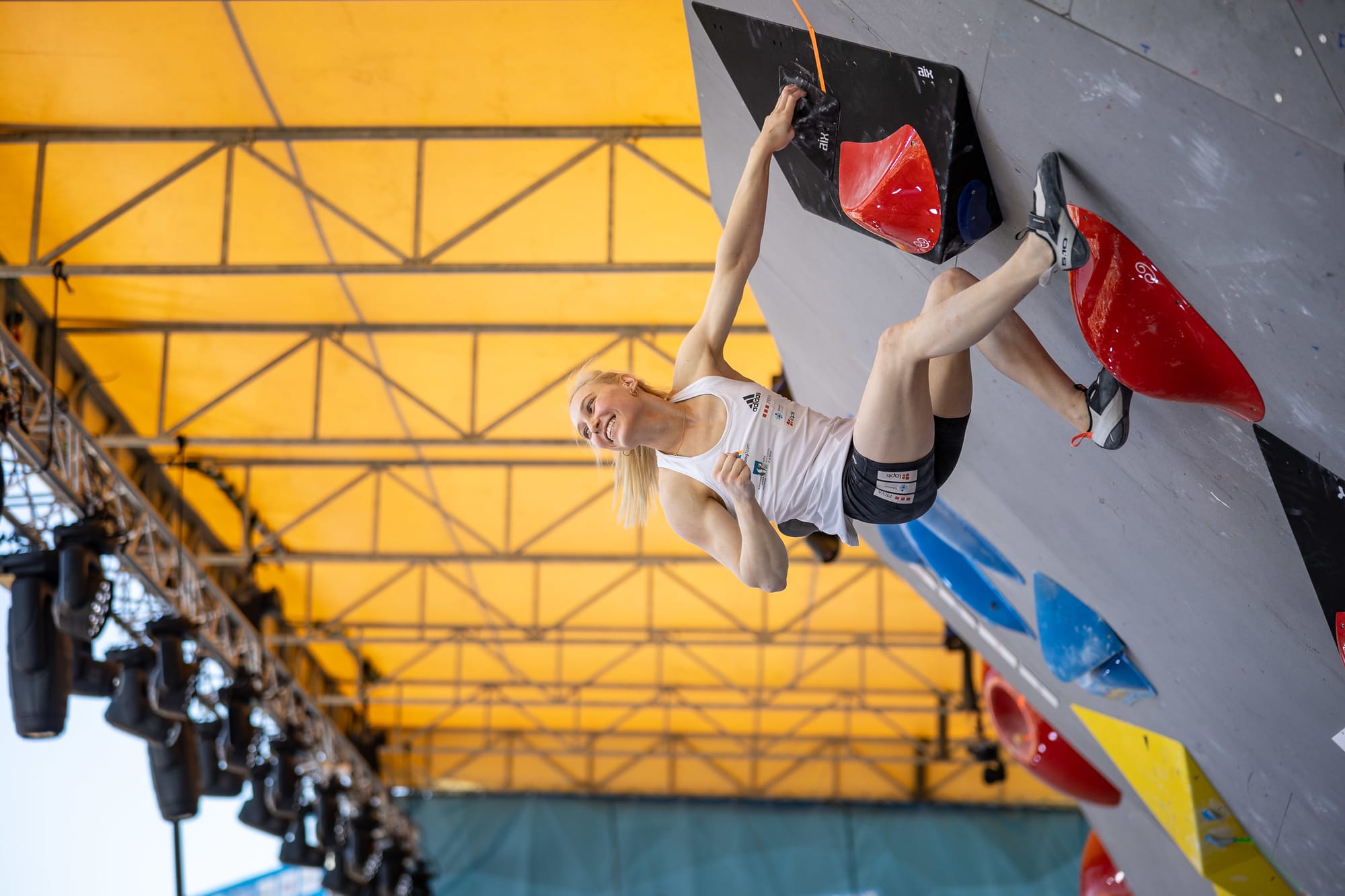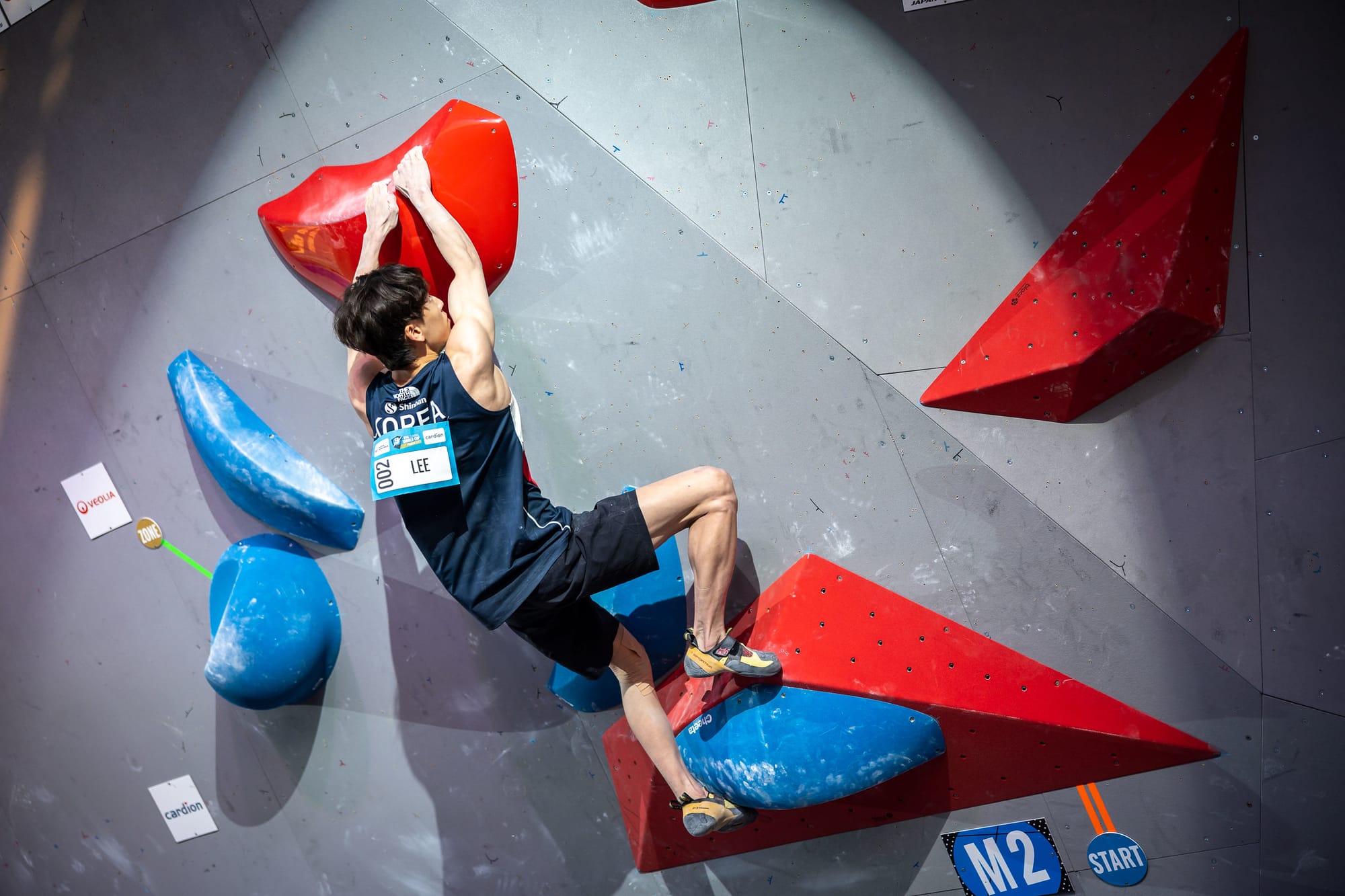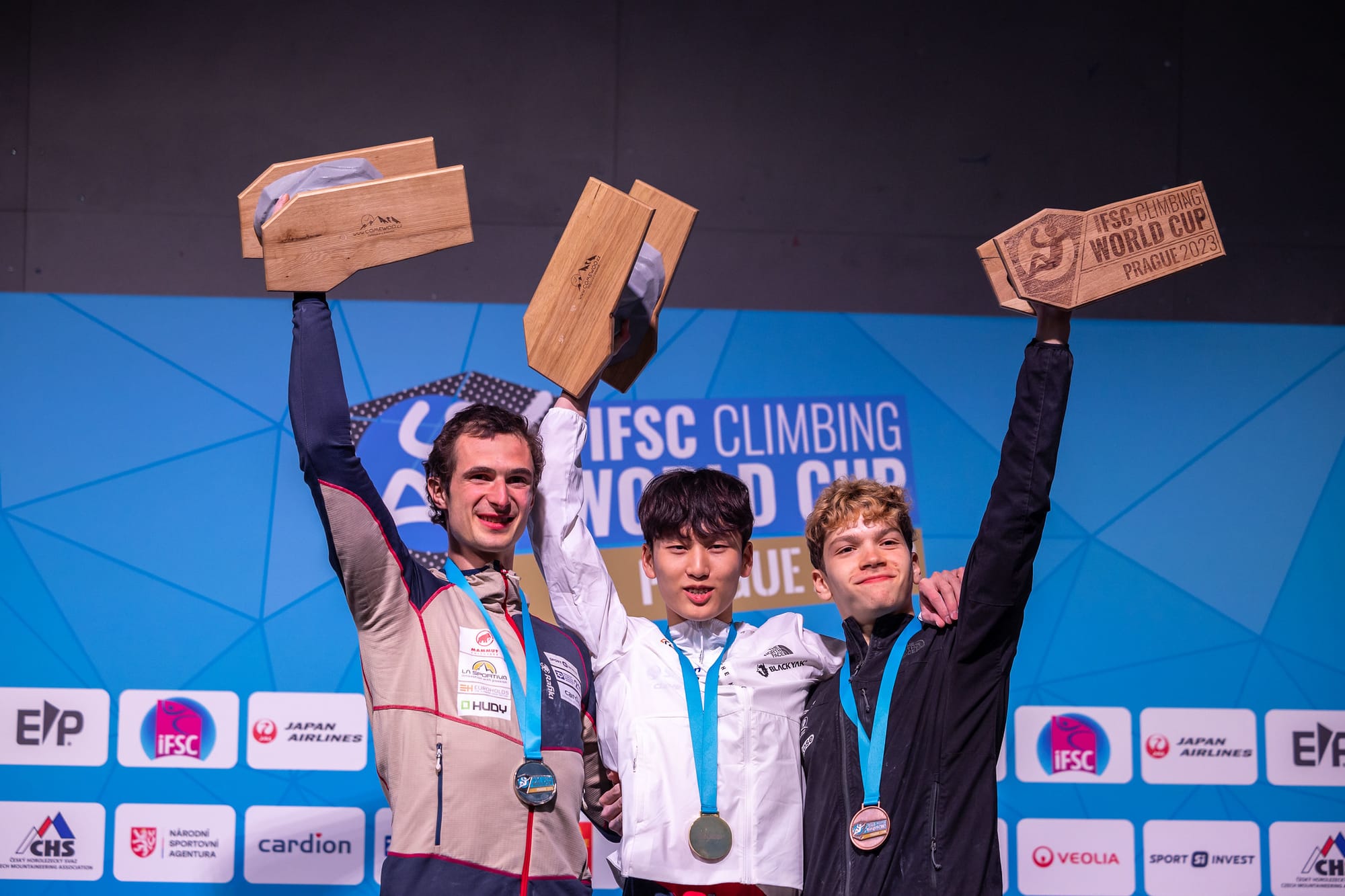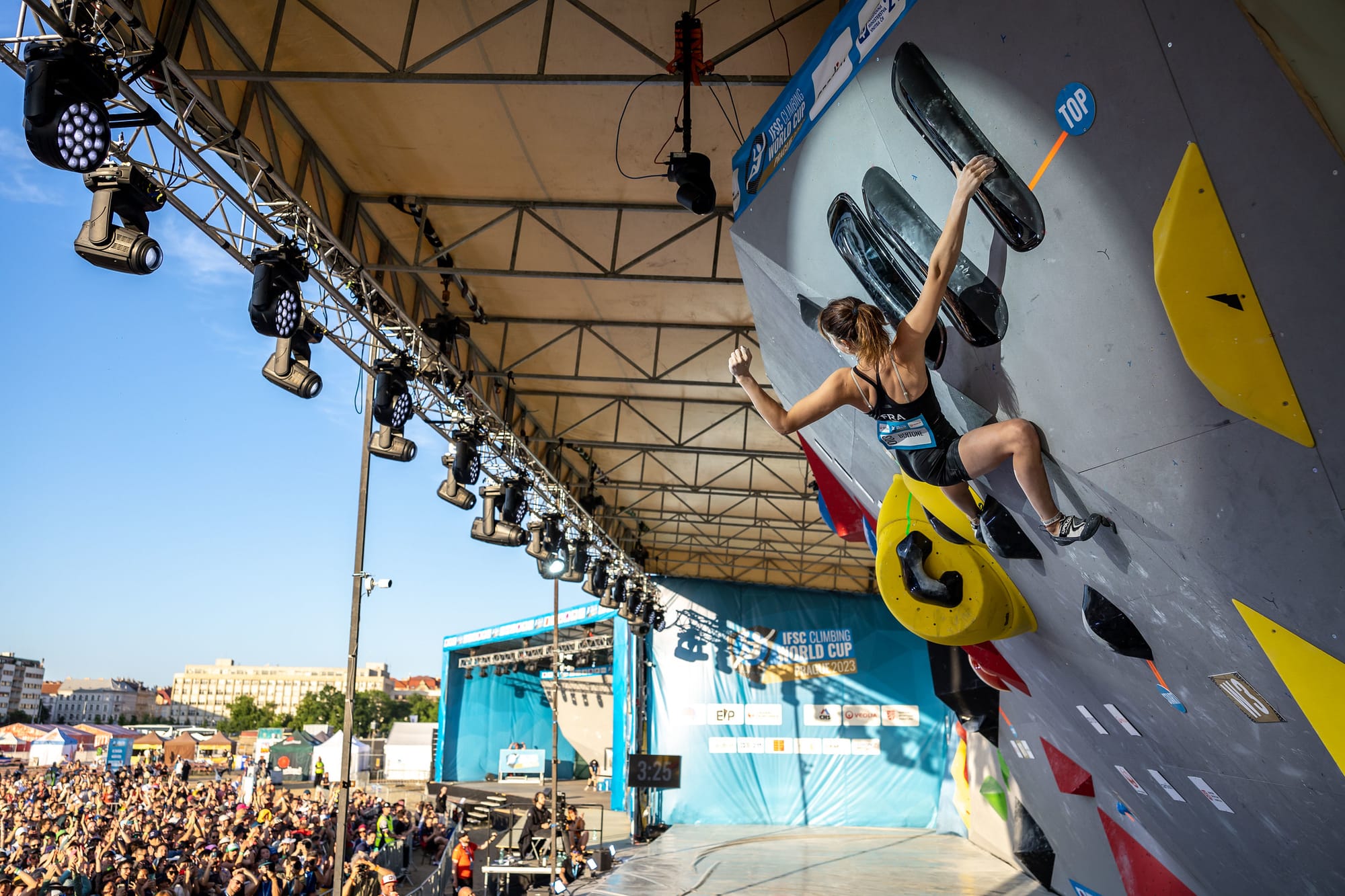Oriane Bertone came out first to the second boulder of the final on the slab. Topping the first boulder in two tries had put her into the top three. The slab had an awkward run and jump to get stood up on two large yellow volumes, and the second had to be pushed further out from the wall so athletes could stand on it.
She moves confidently across to the zone hold, weighing her feet carefully. She reaches the zone hold and re-adjusts her feet. She pounces up to the final hold, a large red dual-tex macro upside down. She holds it, flashing the boulder.
As she waits backstage, no one else topped the boulder except her teammate Flavy Cohaut in her first finals. Even the Queen, Janja Garnbret, could not hold the final hold.
This was the moment Bertone won the competition.
For Dohyun Lee, the moment came much later in the competition. He was the last climber out on the fourth men’s boulder, and every other athlete had flashed the boulder. He needed to top the boulder in less than 8 attempts to win over the home favourite, Adam Ondra.
After pulling on, he looked to the high-risk toe catch method before using a high left heel, which most other athletes had used. He manages to reach the zone hold on his first attempt. A further dyno to the final hold, and he flashes the boulder to win his first gold medal.
How it Happened
The competition in Prague had a large field with 104 male athletes and 84 female.
A season high.
Despite this, we missed several experienced competitors, including Natalia Grossman, Brooke Raboutou, Hannah Meul, and Fanny Gilbert. Janja Garnbret, the Queen of competition climbing, did return to competition in Prague after she broke her right toe and required foot surgery. Adam Ondra also returned for his home World Cup after trying the hardest outdoor route in Norway. Ondra last competed at the European Championship in Munich in August 2022.
The qualification rounds were tough, and many athletes missed out on the semi-finals, including Gregor Vezonik, Sean Bailey, Alex Megos, Jakob Schubert, Paul Jenft, and Manuel Cornu.
Former bronze medalist Zhilu Lu narrowly missed out in the 21st alongside former World Champion Petra Klinger. Jenya Kazbekova, Chloe Caulier, and Laura Rogora failed to progress to the semi-final.
The semi-finals went right to left for the Men, going from the steepest area of the wall to the slab, a point the co-commentator and routesetter Cody Grodzki made clear was the intention of the route setters. The organisers had wanted to go from left to right.
The first problem required a hard, powerful coordination move, which only 8 athletes could solve to reach the zone hold. Only 4 athletes managed to reach the top afterwards. The second and third problems were the easiest. The second was a fairly basic boulder, while the third featured a dynamic start and a strong finish, as the vertical hand holds made for bad footholds. The fourth slab boulder would be more tricky than the first problem, with only 4 male athletes topping the boulder.
The slab was very important for Ondra, with a top in two attempts securing him a place in the final. Lee looked dominant alongside a resurgent Yoshiyuki Ogata, each dominating the powerful first 3 boulders. Mejdi Schalck looked not his usual self, but a quick top on the first and last boulder secured him a spot in the final. Jan-Luca Posch and Yannick Flohé also reached the final, enjoying the steep wall’s power boulders.

The women went left to right, starting on a tricky slab that would only see 7 tops. The whole round was hard, with only 26 tops across all 20 competitors. Athletes had the most success on the third boulder. It featured a jump from an awkward start out to a deep juggy pocket and finished with powerful moves on small crimps and large slopey rails. The final boulder was the hardest, with only 5 female athletes reaching the zone and only Garnbret and Futaba Ito topping the boulder.
Garnbret and Ito finished first and second in the round, while Bertone sneaked into the finals in 6th place. Her teammate Cohault reached her first Boulder World Cup final in third after quickly topping the first three boulders. Stasa Gejo and Miho Nonaka rounded out the final competitors with tops in the first three boulders.
The Finals
Seeing Adam Ondra back in a Boulder World Cup final just feels right. Despite sporadic attendance at competitions over the past 14 years, he has always delivered when he puts his mind to it, and this final was no different.
The final started with a tricky jump that looked like a Mejdi Schalck boulder. Schalck flashed it, reaching the top of the boulder on his first attempt. Ondra had to persist, getting the top on his 6th attempt. Five athletes would top the boulder, but many took a lot of attempts.

The second boulder featured a dynamic start but was easier with 4 athletes flashing it. Ondra kept going despite the boulder not being his preferred style; he topped it out on his 3rd attempt. Ondra looked so happy with the top.
The third problem on the slab would be where the top two would be decided. The slab proved tricky for Flohé, who had trouble getting established on the bolder, which tested an athlete’s flexibility. He ended his attempt by thoroughly brushing the boulder for the next competitor instead of attempting it. Ondra made quick work of the lower section of the boulder, but it took him until his 3rd attempt to secure the top hold. For Ogata and Schalck, the final move proved illusive, neither reaching the top. Lee came out last to put on a showcase in slab climbing with a flash.
The last boulder of the final was, unfortunately, an anti-climax. The boulder was set on the steepest end of the wall and, at first glance, appeared to require a jump into a press-toe catch to reach the zone hold. However, despite the route setters’ attempts to block the start hold, the athletes found a way to place their left heel on the start hold and launch themselves to the zone hold. The final jump to the top was also straightforward for the athletes. Every athlete flashed the boulder.
Lee would take gold with 4 tops in 5 attempts, a stunning performance to take his first gold after winning a silver medal last year in Innsbruck. Ondra was overjoyed to win with silver on his return to competition in front of his home crowd. It was great to see his passion for competing. Schalck could not match his performance in the first two competitions, winning only a bronze medal.

The women’s final looked like it was Janja Garnbret’s to lose. With five tops in qualification and four in the semi-finals, she looked like she had never left. She and Miho Nonaka flashed the first boulder despite the dynamic start, which perplexed Stasa Gejo, Futaba Ito, and Flavy Cohaut. Oriane Bertone would do it on her second attempt.
The second boulder was different — a tricky slab on large slopey volumes which required athletes to stand on their feet and trust them. Garnbret did not look happy weighing her feet as she pulled herself up the climb with sheer physical and mental strength. On the last move to the finish, her reluctance to stand on her right foot, the foot whose toe she broke earlier this year, showed. Despite 3 attempts, she kept slipping and could not reach the final hold. Both French athletes would fair differently, with Bertone flashing the boulder and Cohault topping it on her third attempt.
The third boulder would also prove to be decisive. Bertone flashed the triple paddle dyno by jumping with two hands to the next hold and again to the zone hold - a method no other athlete attempted. From there, she casually topped out the boulder. Cohault managed to hold the zone hold with one hand on her third attempt and top the boulder to put her into third place. Garnbret would be the only athlete to complete the triple paddle, ending in a reverse dunk of the zone hold with her right hand, but it took her four attempts. She topped out the boulder so the competition would come down to the last boulder.

Because of the number of attempts on Boulder 3 and as Garnbret didn’t top the slab, Bertone only needed to reach the zone to win the competition.
The final boulder was a hard power climb that looked tailor-made for Garnbret. It features a campus section in the middle, forcing athletes to face the crowd.
Bertone would flash the zone after sticking the dynamic first move but couldn’t make it much further. Back on the mat, the emotions were clear to see. She knew she had won, and tears of joy ran down her face. She took a moment to compose herself before continuing on the boulder, trying to find a method to work around the campus section. When her time was up, she ran to celebrate with her coaches.
Nonaka would make headway on her first attempt, touching the top hold but being able to hold it. The physicality of the boulder showed, with each climber’s first attempt being their best. When Garnbret came out, it looked like a completely different boulder. She casually made the dynamic first move, then climbed footless through the hard section middle section before navigating the trick top to flash the boulder. It was a climb worthy of winning the competition, but unfortunately, she would have to settle for silver. Cohaut’s performances on Boulder two and three would earn her a bronze medal in her first Boulder final.
Bertone’s win puts her in first place in the overall Boulder ranking, thanks to her second in Salt Lake City and Seoul ahead of Brooke Raboutou. Nonaka retains third place overall, with fourth place in Prague, to move ahead of Natalia Grossman. With Raboutou not registered in Brixen, the season is open for Bertone. If Bertone attends and does well in Brixen, she has a good chance to clinch the overall title at the final competition in Innsbruck.
Schalck extended his lead in the overall, and Dohyun Lee’s win moved him into third place after a 4th in Seoul and a 7th in Hachioji. Tomoa Narasaki retained his 2nd place despite finishing 10th in Prague, despite his performances in Seoul, Hachioji, and Salt Lake City.
The last time a French woman won a Boulder World Cup was Juliette Danion in Brno in 2007. 16 years later, we have another French World Cup winner. Oriane has 7 silver Boulder World Cup medals to her name, which must make her gold so much more special. Alongside Mejdi and Flavy’s bronze medals, the week was a victory for the French.





